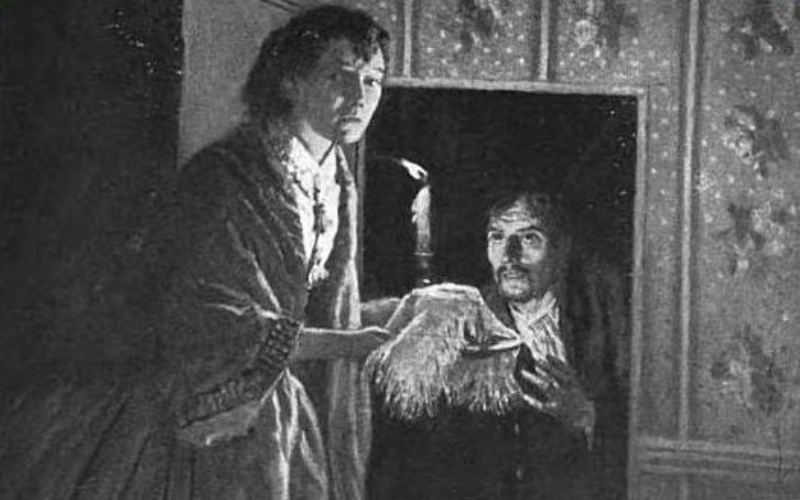What if I told you that one of the Union’s most daring and effective spies during the Civil War was dismissed as a madwoman—right in the heart of the Confederate capital?
Meet Elizabeth Van Lew, the woman Richmond society called “Crazy Bet.” They weren’t just wrong—they were wildly wrong.
Behind her carefully crafted persona of an eccentric Southern lady, Elizabeth Van Lew ran one of the most effective espionage operations of the entire war—and she did it under the noses of Confederate officers.
The Mask of Madness
Van Lew grew up in a wealthy, slaveholding family in Richmond, Virginia. But unlike most around her, she harbored a fierce abolitionist spirit. When the Civil War erupted, she chose the Union—at great personal risk and cost.
To operate in hostile territory, Van Lew created a disguise that would allow her to move freely and without suspicion. She adopted the persona of a scatterbrained, mentally unstable woman, muttering to herself, wandering the streets aimlessly, and saying just enough strange things to be dismissed as harmless. Richmond’s elite wrote her off as a social oddity. That was her greatest weapon.
Eggshells and Espionage
Behind the disguise of “Crazy Bet,” Van Lew orchestrated a highly sophisticated spy ring. She used hollowed-out eggs, laundry baskets, and even bouquets of fresh flowers to smuggle secret messages and troop intel to Union commanders.
Her network included free and enslaved Black people, shopkeepers, and even Confederate clerks, all loyal to the Union. One of her most valuable agents worked inside the Confederate White House itself. The information Van Lew passed along—written in invisible ink or hidden in false-bottom trunks—was game-changing for the North.
Helping Grant Crack Richmond
Perhaps her most legendary contribution came during General Ulysses S. Grant’s 1864 campaign. With precision and bravery, Van Lew fed him intelligence on Richmond’s troop positions, fortifications, and internal disarray—directly influencing Union strategies and hastening the fall of the Confederate capital.
When Grant’s troops finally marched into Richmond in April 1865, the general made a personal visit to thank Van Lew for her extraordinary service. She had risked everything—and she’d done it brilliantly.
The Price of Patriotism
Elizabeth Van Lew paid dearly for her loyalty. The war destroyed her family’s wealth and social standing. Post-war Richmond treated her as a traitor, and she lived in relative isolation, ostracized by neighbors she had once called friends.
But she never regretted it.
Van Lew once said, “I was considered insane for doing what I did. But the world shall know that I was not.” And history has proven her right.
Today, Elizabeth Van Lew remains one of the most fascinating figures in espionage history—a true master of psychological warfare who fought not with bullets, but with brilliance, courage, and illusion.
In an age when women were expected to stay silent and still, she turned society’s underestimation into her greatest weapon. “Crazy Bet” wasn’t crazy at all. She was a genius in plain sight.
Don’t forget to tune in…
If you’ve enjoyed this article, there are also articles on the assassination of Aberham Lincoln and when Easter and Holy Week were banned by the Puritans.
You can now tune in to the full audio version of this week’s blog on the Bells Books Blog Podcast, or it is now available on Amazon Music/Audible, Apple Podcasts, Castbox, Deezer, iHeart Radio, JioSaavn, Podcast Addict, Podchaser, Spotify, and Spreaker.
Thank you for joining me this week as I explore some historic secrets, spies and sacred controversies.
If you’ve enjoyed this article, I encourage you to sign up for my weekly blog. When you do so you will get a free copy of Yesteryear’s Ruin, the prequel to my new Case 47 series.
Until next time, keep your curiosity alive and your imagination ignited— and as always, keep the past alive!





 “Yesteryear’s Ruin” captures the essence of human resilience in the face of unimaginable loss. Through a narrative that weaves together love, despair, and the quest for redemption, this historical psychological thriller invites readers into a world where the past is not merely a memory, but a realm that may hold the key to our deepest desires and darkest fears.
“Yesteryear’s Ruin” captures the essence of human resilience in the face of unimaginable loss. Through a narrative that weaves together love, despair, and the quest for redemption, this historical psychological thriller invites readers into a world where the past is not merely a memory, but a realm that may hold the key to our deepest desires and darkest fears.